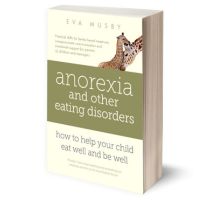Extracts from Chapter 11 of 'Anorexia and other eating disorders – how to help your child eat well and be well'
How can you foster teamwork with your partner, your other children, and your wider family? How to navigate financial pressures, work demands, and people who don’t understand?
The logistics: how can you care for your child and attend to your other commitments?
For a while, caring for a child with an eating disorder requires major shifts in the parents’ lives. This is easier for some of us than for others. Some parents are looking after their children alone. Some have strained relationships with an ex. Some are caring for other children or elderly parents who need intensive support. Some are in treatment for their own health. Even in conditions that seem ideal (ample support, financial ease, flexible work), caring for an ill child turns your life inside out. Every parent needs recognition for their heroic work.
We take temporary leave from work and worry our employers will run out of patience. We stop activities that used to sustain us. We stop going to the dentist. But as the saying goes, this is a marathon, not a sprint. How can you restructure your life so it works for you?
Here are some ideas. See if any might help you now or later. I’ve collected them from parents who are married, single, divorced, full-time workers, freelancers – and whose young or older children are at various stages of the recovery journey.
- Both parents take a few weeks off work for the early refeeding stage.
- One parent takes compassionate sick leave for an indefinite time period. The employer is sympathetic.
- One parent is signed off work by their doctor for stress or depression.
- One or both parents shift from full-time to part-time work, or work from home.
- One parent resigns from their job.
- The child enters inpatient or day treatment.
- Parents lobby for their child to be moved from a distant hospital to a closer one. (In the UK, if you know of an excellent private treatment facility, your doctor may be able to arrange access to it free of charge.)
- Grandparents, friends or paid professionals take on some tasks
- Parents resume full-time work and support meals by phone or video call.
- Parents prepare the lunchtime meal before leaving for work; their child manages to eat it at home without supervision.
- The child spends time at their parent’s workplace.
- Friends or hired help support siblings with homework or taxiing to activities.
- This is a great time to tell your other kids that their wish to abandon competition Highland dancing is granted.
- Therapy sessions that aren’t helping are stopped.
- Driving time is reduced by switching some therapy to video calls.
- Parents take turns being home while the other gets a break.
- Parents delegate more. They get a cleaner, gardener, dog walker, or agency carer. If they’re the main carer for an elderly parent with, say, dementia, this is the time to get state or private support.
- Parents install locks on cupboards and the fridge, or lock away sharp objects, to reduce risk when they need to leave their child alone.
- Parents move their own bed – or their child’s – close, so they can keep their child safe at night and still get some sleep.
- Authorities (medical, social work, charities) provide financial support.
- Parents who can’t easily leave the house receive regular emotional support by phone or online – from trusted friends, helplines, parent groups or a counsellor.
Parents let go of the crazy myth of self-sufficiency. They ask for exactly the help they wish for, and trust that others find pleasure in helping.
[Jumping to another section of the chapter…]
Your spouse or partner
Whether you’re in a loving relationship or divorced, teamwork is crucial. You don’t want to hear, ‘But Mum doesn’t put butter on my toast.’ As some like to put it, an eating disorder likes to triangulate – to divide and rule.
Teamwork is precious
“Since I became more than just a father on the fringes and became actively involved, we have been able to support the journey to recovery for D and the whole family.”
Try not to end up with one ‘competent’ (and possibly martyred) person doing all the caring, while the other (‘useless’) parent becomes de-skilled and excluded. There’s a lot of shame and helplessness for the parent who’s pushed aside, and this may lead to depression or anxiety. The child receives the unfortunate message that one of their parents can’t be relied on. Meanwhile, the ‘competent’ parent is not only exhausted but may grow resentful. […]
[Jumping to another section of the chapter…]
Siblings
I have only one child, so when it comes to siblings, I can only share what I’ve learned from others. Key points are good listening, empathy, and unconditional love and acceptance – just as for your ill child.
- In a family-based approach, siblings are included in sessions because everyone needs support, and everyone is offered a role in the treatment. After a while, siblings may lose interest in attending. But by then, hopefully they’ve heard that they’re not responsible for their sibling’s illness, nor for their parents’ distress. Normally they shouldn’t be asked to help their sibling eat or to spy on eating in school. (But they need to know that if they do find and report cheating, the adults are the ones who will handle it). They’re encouraged to behave like anyone would with a distressed brother or sister: with kindness, listening, hugs or doing fun things together. Older siblings living away might learn that rather than coming home, sending little messages of support is enough.
- Siblings may blame you, your ill child or themselves. They may believe eating disorder myths from peers or the media. A sense of stigma may make them more guarded around friends. So they need an appropriate level of education about the illness.
- The impact on siblings varies from child to child and can shift over time. Some are very upset and want to help. Some are scared and withdrawn. Some are distressed, some fed up with their sibling’s meltdowns. Some feel resentful because family life has been turned inside out. Some feel they’ve lost their confidant or playmate. Some feel guilty, thinking they’re somehow responsible for the illness (especially if they used to talk about body shape). They may feel guilty for not being ill, for having fun, for not doing more to help, for avoiding home. They may also feel ashamed of their own outbursts, knowing that these make life harder for everyone.
- Sometimes siblings make innocent but harmful comments, or they deliberately stir up trouble. I believe they need more unconditional love and acceptance – not less. You might explore what the sibling can do (play a video game?) to stay out of the way during fireworks.
- My guess is that siblings might have acute needs for security, stability, hope, and fun (I list typical needs of children in Chapter 13). Those needs don’t need to be met exclusively by you. For instance, you may not have the time to teach your child to drive, but your sister might. And while mealtimes are full of drama, you could allow a sibling to eat in another room or spend more time with a trusted relative or friend.
- Siblings can be scared to see their parents struggling to cope. They may minimise their own needs to reduce your burden, telling themselves you’re too busy or overwhelmed. The trick is to meet their deeper needs so they can safely stretch in relation to everyday frustrations. So let them see that you care, that you love them, that you have plenty of emotional space for them – and that you’re frustrated you can’t give them your attention exactly when they’d like it. Make it clear that you’re resourceful, that you continue to be their loving and emotionally available parent, and that they mustn’t ‘protect’ you by hiding their troubles. See if you can walk your talk by having at least one parent schedule regular one-on-one time.
- Your children may find themselves supporting you more than is appropriate for their age, capabilities and needs. So try to get your emotional top-ups from other sources. A caring child may feel guilty or helpless when they can’t make their parents happy. To offer ideas, here’s how I communicated with my daughter during a time when I was overwhelmed by my elderly mother’s needs. I tried to make very specific requests (‘I’d like to collapse with a cup of tea and not have to check you’re ready for your sleepover. Would you pack your bag and be ready to leave at 6.00 pm?’ or ‘Before you switch on the TV, I would love one huge hug!’). This was so she didn’t have to guess what was going on for me or feel responsible for my foul mood or tears.
- It can be hard for the ill child to accept they must eat more than their brother or sister, or to see them going off on fun activities. Empathy is key, as always.
- While things were tough, I imagined I was lucky to only have one child to care for. Yet what I’m hearing from some parents is that the normality and companionship they get from their other children is a blessing.
[End of extracts from the chapter]
In this chapter:
- The logistics: how can you care for your child and attend to your other commitments?
- Single parents
- Your spouse or partner
- Siblings
- Prevention for your other children
- Family and friends: how to make good use of them
- Links with other parents in the same boat
- Work and money
Where to next
* Next: Chapter 12: Which treatments work? *
And the following resources may be useful to you right now:
Endnotes
[1] Get support from Kym Piekunka. Read Dr Sarah Ravin: ‘A Seat at the Table: Understanding and Helping the Siblings’, Also Kym Piekunka and Bridget Whitlow interviews for F.E.A.S.T. and youtu.be/OFOWLdmlL_w and podcast edcatalogue.com/what-are-siblings-reporting Also ‘An awareness of the impact on the siblings & how they may cope’ by C Varnell on CaredScotland caredscotland.co.uk/entry-recovery/recovery-6 Also ‘A sibling’s perspective’ on feast-ed.org/a-sisters-perspective
[2] Insight into living with a twin sister with anorexia’ youtube.com/watch?v=rXD8tdvdXQc and ‘How to support a friend with an eating disorder’ youtube.com/watch?v=ieSK_LYuaPA
[3] A book by Brian Lask and Lucy Watson might provide a starting point, though I haven't read it: Can I Tell You About Eating Disorders?: A Guide for Friends, Family and Professionals. Note that anorexia is equated with being really skinny – something which hopefully you can correct.
[4] Shaw, H., Ranceva, N. & Langdon, D. Parents’ experiences of caring for a child with an eating disorder: the impact of financial challenges. J Eat Disord 13, 209 (2025). doi.org/10.1186/s40337-025-01278-y









LEAVE A COMMENT (parents, use a nickname)